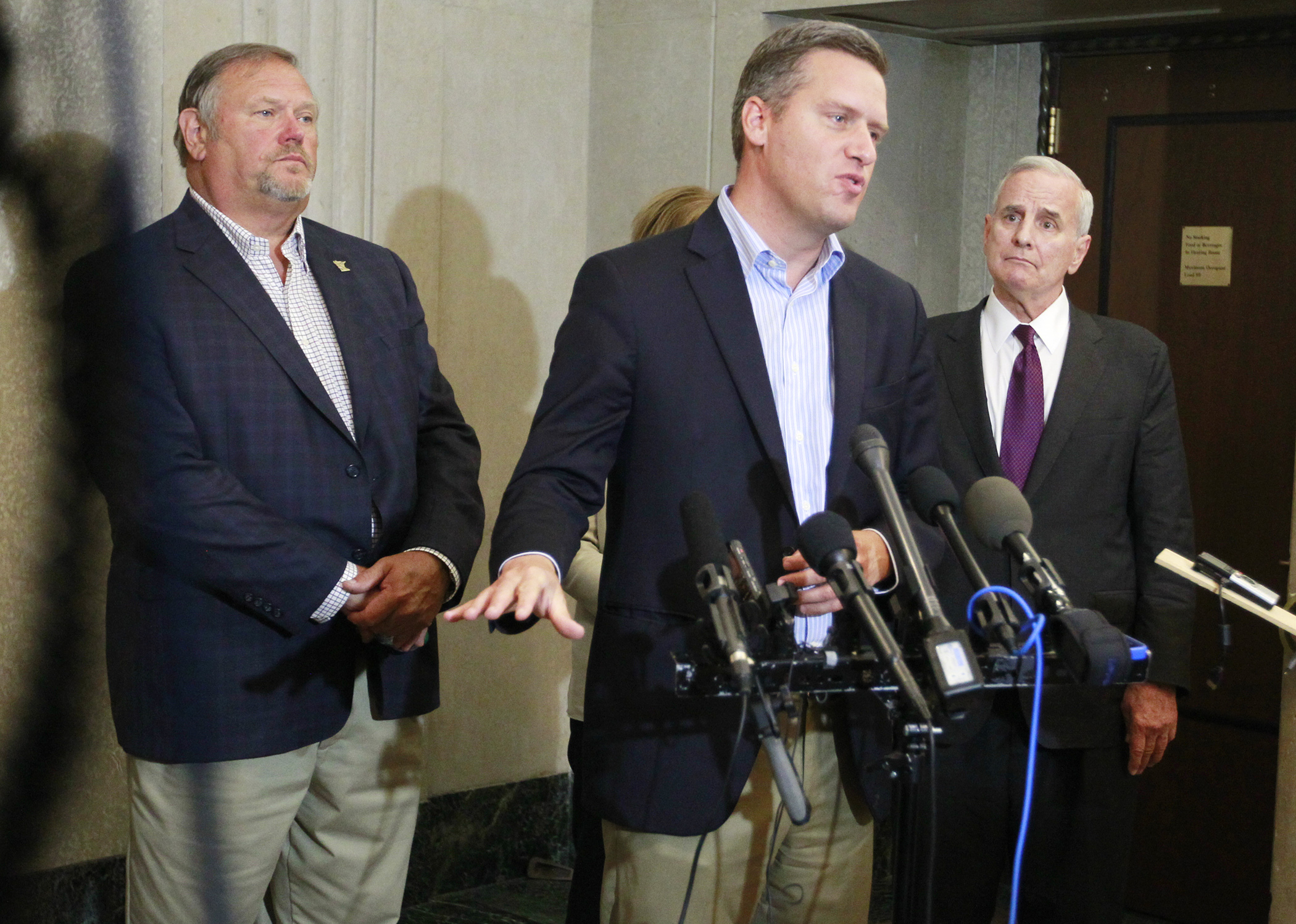Dayton, legislative leaders close to wrapping December special session deal

Just in time for Christmas, the Legislature could be providing gifts to many Minnesotans.
Gov. Mark Dayton and caucus leaders met for more than an hour Friday afternoon in hopes of reaching agreement on health care premium cost relief and reviving the bonding and tax bills that failed to be signed into law earlier this year.
While nothing has been finalized, a sense of optimism was present.
“We don’t have a deal … but we outlined the parameters of the three pieces,” Dayton said.
“I’ve been in the room when the deal happens and I feel like I can see it,” said House Speaker Kurt Daudt (R-Crown). “The devil sometimes is in the details.”
Dayton said groups in each area would begin working out details on Monday with their work to be completed by Wednesday. “Then we will know where we stand, what we agree on and what we still don’t agree on. … We’ll see what happens and go from there.”
The plan is for legislators to get the final language Dec. 16, with a special session likely taking place Dec. 20, “give or take one day,” according to Daudt.
He said a special session could take place in a temporary chamber, such as occurred in 2015 when both chambers gathered in State Office Building hearing rooms.
 House Speaker Kurt Daudt, center, Senate Majority Leader Tom Bakk, left, and Gov. Mark Dayton, right, address the media following a meeting on a potential special session in July. House Photography file photo
House Speaker Kurt Daudt, center, Senate Majority Leader Tom Bakk, left, and Gov. Mark Dayton, right, address the media following a meeting on a potential special session in July. House Photography file photo“Minnesotans certainly deserve relief on the health care premiums and there’s no reason we shouldn’t be able to do that,” said Rep. Melissa Hortman (DFL-Brooklyn Park), House Minority Leader-designate. “The real test of whether we have a meeting of the minds on all three components to have a special session will be when the documents are written.”
In terms of a health care rebate, Dayton is urging consideration of a premium rebate program he proposed in late October with a price tag capped at $313 million. He also stressed inclusion of access and continuity of care provisions.
Anything else, he believes, can wait until the Legislature reconvenes for its 2017 session on Jan. 3. Additionally, there is uncertainty at how federal changes could affect health care costs and access.
Dayton said health care relief funds could come from the $334 million that was added earlier in the day to the state’s budget reserve. “We’re talking about an emergency situation … for a lot of people of Minnesota.”
The meeting took place just hours after the state’s latest budget forecast shows a projected $1.4 billion surplus.
“The door could have been slammed today had the forecast gone south,” said Senate Majority Leader Tom Bakk (DFL-Cook). “I believe we have adequate resources to be able to accomplish the three really large pieces that are outstanding.”
Daudt indicated the tax bill would be similar to the one passed in May sans the one-word error that would have cost the state more than $100 million.
“The tax bill really has some real tax relief in it for the same people who are impacted by the increases in the premiums, farmers and small-business owners, so they really do fit together,” he said.
The bonding bill would likely omit the $300 million cash that was included in the final product.
“What we did to make room in the bonding bill was move some transportation projects into trunk-highway bonding and then we put some of the governor’s projects in to cash,” Daudt said. “It’s one of those things that needs to be negotiated if we remove the cash from the bill how do we fit those projects in or how do we prioritize what to fit into a bonding bill.”
Bakk doesn’t anticipate passage of a $1 billion bonding bill in 2017, a traditional budget-setting year for the Legislature, nor does he see support for a $2 billion package in 2018.
“What this means to me is all these projects are going to wait until 2018 before they get considered. Construction and inflation are going to require all them to be more expensive. … If the bonding bill waits until ’18, we get a billion dollars behind,” he said.
Related Articles
Search Session Daily
Advanced Search OptionsPriority Dailies
Speaker Emerita Melissa Hortman, husband killed in attack
By HPIS Staff House Speaker Emerita Melissa Hortman (DFL-Brooklyn Park) and her husband, Mark, were fatally shot in their home early Saturday morning.
Gov. Tim Walz announced the news dur...
House Speaker Emerita Melissa Hortman (DFL-Brooklyn Park) and her husband, Mark, were fatally shot in their home early Saturday morning.
Gov. Tim Walz announced the news dur...
Lawmakers deliver budget bills to governor's desk in one-day special session
By Mike Cook About that talk of needing all 21 hours left in a legislative day to complete a special session?
House members were more than up to the challenge Monday. Beginning at 10 a.m...
About that talk of needing all 21 hours left in a legislative day to complete a special session?
House members were more than up to the challenge Monday. Beginning at 10 a.m...